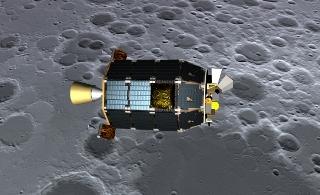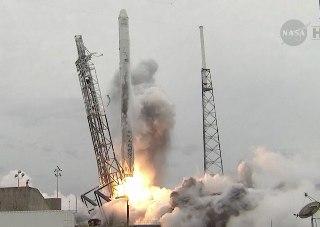
Concept art showing LADEE over the lunar surface. A NASA photo.
CAPE CANAVERAL, FLORIDA (AP): NASA's robotic moon explorer, LADEE, is no more.
Flight controllers confirmed that the orbiting spacecraft crashed into the back side of the moon on Friday as planned, avoiding the precious historic artefacts left behind by moonwalkers.
LADEE's annihilation occurred just three days after it survived a full lunar eclipse, something it was never designed to do.
Researchers believe LADEE likely vaporized when it hit because of its extreme orbiting speed of (5,800 kph), possibly smacking into a mountain or side of a crater. No debris would have been left behind.
"It's bound to make a dent," project scientist Rick Elphic predicted on Thursday.
By Thursday evening, the spacecraft had been skimming the lunar surface at an incredibly low altitude of 300 feet.
Its orbit had been lowered on purpose last week to ensure a crash by Monday following an extraordinarily successful science mission.
LADEE short for Lunar Atmosphere and Dust Environment Explorer was launched in September from Virginia. From the outset, NASA planned to crash the spacecraft into the back side of the moon, far from the Apollo artefacts from the moon walking days of 1969 to 1972.
Scattered over the near side of the moon: the landing portions of six lunar modules, flags, plaques, rovers and more, not to mention those memorable first footprints by Neil Armstrong and Buzz Aldrin. Apollo 12 had been projected to be closest by several hundred miles.
The last thing the LADEE team wanted was "to plow into any of the historic sites," said project manager Butler Hine.
LADEE completed its primary 100-day science mission last month and was on overtime. The extension had LADEE flying during Tuesday morning's lunar eclipse; its instruments were not designed to endure such prolonged darkness and cold.
But the small spacecraft survived it's about the size of a vending machine with just a couple pressure sensors acting up.
The mood in the control centre at NASA's Ames Research Centre in Mountain View, California, was upbeat late on Thursday afternoon, according to Hine.
"Having flown through the eclipse and survived the team is actually feeling very good," Hine told The Associated Press in a phone interview.
But the uncertainty of the timing of LADEE's demise had the flight controllers "on edge," he said.
As it turns out, LADEE succumbed within several hours of Hine's comments. NASA announced its end early on Friday morning.
 Previous Article
Previous Article Next Article
Next Article













The Indian Air Force, in its flight trials evaluation report submitted before the Defence Ministry l..
view articleAn insight into the Medium Multi-Role Combat Aircraft competition...
view articleSky enthusiasts can now spot the International Space Station (ISS) commanded by Indian-American astr..
view article